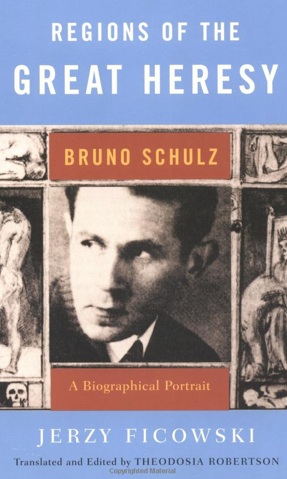 At the 92nd Street Y tonight, I joined KtB author Ann Neumann for a lecture by the Israeli novelist David Grossman on Bruno Schulz. Jonathan Safran Foer, in turn, introduced Grossman. Grossman said that everybody remembers when and how they discovered Bruno Schulz—I am no exception. It was in my first college fiction writing class, assigned by the teacher, Sandy Florian. The Street of Crocodiles condemned me to a wonderful year writing in the service of description, that fantastic event where—and I’m borrowing from Grossman here—the text becomes indescribable except by itself.
At the 92nd Street Y tonight, I joined KtB author Ann Neumann for a lecture by the Israeli novelist David Grossman on Bruno Schulz. Jonathan Safran Foer, in turn, introduced Grossman. Grossman said that everybody remembers when and how they discovered Bruno Schulz—I am no exception. It was in my first college fiction writing class, assigned by the teacher, Sandy Florian. The Street of Crocodiles condemned me to a wonderful year writing in the service of description, that fantastic event where—and I’m borrowing from Grossman here—the text becomes indescribable except by itself.
For Grossman, Schulz was the existential muse of his novel See Under: Love. The throbbing humanity of Schulz’s writing, combined with the emptiness of his murder by the SS in 1942, drove Grossman to put in writing the struggle of “the human sparkle against what was meant to extinguish it.” This is an originary moment, an event where, according to Grossman again, “the forms had not congealed around essences.” “An age of genius,” in which every human being is an artist. He saw it in a celebrated passage from Crocodiles, in Schulz’s description of his father:
It is worth noting how, in contact with that strange man, all things reverted, as it were, to the roots of their existence, rebuilt their outward appearance anew from their metaphysical core, returned to the primary idea, in order to betray it at some point and to turn into the doubtful, risky and equivocal regions which we shall call for short the Regions of the Great Heresy.
Grossman proposes the Great Heresy, the irreducible miracle and mystery of every human individual, in rebellion against the sterility of mass murder. Which is to say, for an Israeli author speaking to a largely Jewish venue—where a display commemorating Israeli Independence Day graces the entrance, next to the metal detectors—the Shoah. This event, says Grossman, defines his whole identity as an Israeli, a Jew, an artist, a father, a son, and so on. And I too am alive only because of ancestors who escaped that great murder.
Let me stop myself before I declare all that this eternal return has borne, this cosmology in which a genocide stands forever as the originary moment, ever originating. It would be uncharitable to see the tragedy of another people’s oppression so crassly in the words of that oppressor’s great artist. He, after all, has just spoken out against killing, against the smothering of any human spark.
Yet there is a reason we tell one another that God created us out of nothing. That is the originary moment, where dwells the Great Heresy of eternal creation, against the eternal return of the foundational memory. We made genocide; it didn’t make us. And we will continue to make it until we grant ourselves the heresy of letting go.
Comments
4 responses to “Regions of the Great Heresy”
I love his books. I usually go back to them when the spring starts, his descriptions of blooming, crawling greenness that’s bursting out every year is like a poetry. And he uses so many complicated or innovative words, but the rhythm always gives away the sense of it.
Never read him, but I did see this late one night on TV years ago:
http://www.youtube.com/watch?v=N6xG4Nf9Dh4
Great point! Actually, at the end of Grossman lecture, they played that short film. I meant to discuss that in the blog post but got carried away with all the pontificating. Here, I’ll embed that:
Not exactly Wallace and Gromit.